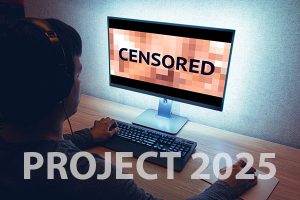Understanding Project 2025: Implications for the Adult Entertainment Industry
 The adult entertainment industry faces a significant threat from Project 2025, a policy proposal spearheaded by a coalition of over 80 conservative organizations — including some that have been trying to censor adult content for decades, as anyone who has worked for Larry Flynt could tell you. If you aren’t fully aware of what it is, you’ve probably at least heard about it on social media.
The adult entertainment industry faces a significant threat from Project 2025, a policy proposal spearheaded by a coalition of over 80 conservative organizations — including some that have been trying to censor adult content for decades, as anyone who has worked for Larry Flynt could tell you. If you aren’t fully aware of what it is, you’ve probably at least heard about it on social media.
The Project 2025 initiative, bolstered by the current partisan conservative makeup of the Supreme Court, aims to now reshape American society through drastic regulatory changes, many of which target pornography and obscene materials. For professionals in the adult entertainment industry, it is crucial to understand these proposals and their potential impact on businesses, personal freedoms, and the broader community, and what might happen if Republicans win the upcoming presidential election this Fall.
What is Project 2025?
Covered in some detail by HBO’s John Oliver recently, Project 2025 is a comprehensive blueprint designed to guide the actions of a potential second Trump administration during its first 180 days. The initiative has been developed by influential conservative groups, including the Heritage Foundation, anti-porn activist group the Family Research Council, and the Alliance Defending Freedom, many of which have also been identified as anti-LGBTQ+ hate groups by the Southern Poverty Law Center.
The document, spanning over 900 pages, outlines policy changes across various domains, from immigration and healthcare to taxation and civil rights. A central focus of Project 2025 is the regulation of pornography, which it broadly defines to include not only traditional adult content but also LGBTQ+ content and other materials deemed obscene under its conservative framework.
Aggressive Content Regulation
One of the most alarming aspects of Project 2025 is its aggressive stance on content regulation. The initiative proposes broad and ambiguous definitions of “obscene materials,” opening the door to extensive censorship. This approach particularly targets LGBTQ+ content and non-traditional family structures, which could be labeled as inherently obscene. For instance, the project characterizes pornography as a tool that promotes transgender ideology and the sexualization of children, a stance that conflates LGBTQ+ representation with harmful content.
Project 2025 calls for the outright ban of pornography, advocating for severe penalties for those involved in its production and distribution. The mandate suggests imprisoning producers and distributors of adult content and even classifying educators and librarians who provide access to such materials as registered sex offenders. This criminalization extends to any digital platforms that facilitate the spread of what the project deems obscene content.
Not to be Captain Obvious here, but this draconian approach raises significant concerns for the adult entertainment industry. The potential for widespread arrests and legal actions against content creators and distributors could devastate the industry, pushing many into the margins and increasing the risk of violence and exploitation, particularly for LGBTQ+ sex workers.
Invasive Verification Processes
To enforce its content regulations, Project 2025 proposes the implementation of stringent identity and age verification processes for accessing online content. While these measures are ostensibly designed to protect minors, they pose substantial privacy concerns. Mandatory identity checks could lead to data breaches and unauthorized surveillance, compromising the privacy of adults who wish to access legal adult content.
Moreover, these invasive verification processes could deter users from engaging with adult content, affecting the revenue streams of content creators and distributors. The added burden of compliance with these flawed and dangerous regulations could also increase operational costs for businesses in the adult entertainment industry.
Reversal of Legal Protections
Project 2025 also aims to reverse legal protections that currently safeguard the rights of LGBTQ+ individuals and those involved in the adult entertainment industry. This includes overturning landmark court decisions and laws that protect against discrimination in employment, housing, and healthcare. The initiative’s stance on sexual privacy and bodily autonomy suggests a rollback of rights they claim are not “deeply rooted” in history, following the precedent set by the Supreme Court’s Dobbs decision, which overturned Roe v. Wade and eliminated reproductive rights for millions of women in America.
For the adult entertainment industry, this could mean increased legal vulnerability and reduced access to essential services. The reversal of protections could lead to heightened stigma and discrimination, further marginalizing those who work in the industry and those who consume its content.
Implications for the Adult Entertainment Industry
Not to be a broken record, but it’s no hyperbole to say the potential impact of Project 2025 on the adult entertainment industry is profound and multifaceted. Here are some of the key implications:
Legal Risks and Criminalization: The threat of legal action against producers and distributors of adult content could lead to widespread arrests and prosecutions. This would create a climate of fear and uncertainty, driving many professionals underground and increasing their vulnerability to exploitation and abuse.
Privacy Invasion: The proposed identity and age verification measures would compromise the privacy of individuals accessing adult content. This could deter users from engaging with content, reducing traffic and revenue for adult entertainment websites.
Increased Operational Costs: Compliance with the stringent regulations outlined in Project 2025 would require significant investments in technology and legal expertise. For many small and independent content creators, these costs could be prohibitive, forcing them out of business.
Censorship and Content Suppression: The broad definitions of “obscene materials” could lead to the widespread censorship of LGBTQ+ content and other non-traditional expressions of sexuality. This would limit the diversity of content available and stifle creative freedom within the industry.
Stigmatization and Marginalization: The criminalization and censorship of adult content would exacerbate the stigma associated with the adult entertainment industry. This could lead to further marginalization of sex workers and LGBTQ+ individuals, increasing their risk of violence and discrimination.
The Importance of Staying Informed and Engaged
Given the significant threats posed by Project 2025, it is crucial for professionals in the adult entertainment industry to stay informed and engaged. Here are some steps that can be taken to protect your business and advocate for the industry’s rights:
Educate Yourself and Your Team. Understanding the details of Project 2025 and its potential impact is the first step in preparing for the changes it proposes. Ensure that you and your team are well-informed about the policy proposals and their implications.
Advocate for Change. Engage with advocacy groups and organizations that support the rights of the adult entertainment industry and LGBTQ+ communities. Support their efforts to challenge regressive policies and promote a more inclusive and equitable society. At the least, this should mean supporting the Free Speech Coalition.
Enhance Privacy Measures. Invest in technologies and practices right now that enhance the privacy and security of your users, regardless of who wins the next presidential election. This includes implementing robust encryption, secure identity verification processes where warranted and possible, and stringent data protection measures.
Diversify Revenue Streams. I hate to say it, but it’s wise to explore alternative revenue streams and business models that can mitigate the impact of potential regulatory changes. This could include diversifying your content offerings, expanding into new markets, and leveraging emerging technologies.
Build a Supportive Community. Everyone is talking about how the industry isn’t the same these days. We can and should work to turn that around. Help foster a supportive and inclusive business community within the industry. Share resources, knowledge, and best practices to help each other navigate the challenges posed by Project 2025 and other regulatory threats.
Project 2025 represents a significant threat to the adult entertainment industry and the broader community of sex workers and LGBTQ+ individuals. Its aggressive stance on content regulation, criminalization of adult content, and invasive verification processes pose serious risks to personal freedoms, privacy, and the viability of businesses within the industry.
By staying informed, advocating for change, enhancing privacy measures, diversifying revenue streams, and building a supportive business community again, we can all better protect ourselves and our businesses from the potential impact of Project 2025.
Larry Flynt is no longer with us. The fight for the rights and freedoms of those within the industry is a shared responsibility, and staying engaged is crucial for safeguarding the future of adult entertainment.
If you haven’t already done so, make sure to sign up for YNOT’s daily email newsletter so you don’t miss any important developments that impact your business.













